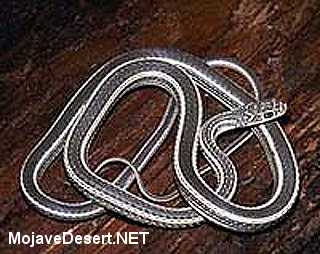Striped Whipsnake
Masticophis taeniatusFamily: Colubridae Order: Squamata Class: Reptilia
DISTRIBUTION, ABUNDANCE, AND SEASONALITY
Striped whipsnakes are fairly common in suitable habitats. In California their range is
restricted to Great Basin habitats east of the Sierra/Cascade crest from northeastern Siskiyou
Co. and Modoc Co. south to the northern Mojave Desert in San Bernardino Co. Absent from
higher elevations in the Warner Mountains. Elevation to 2850 m (9400 ft). Important habitats
in California include eastside pine, pine-juniper, sagebrush, bitterbrush, and desert scrub.
SPECIFIC HABITAT REQUIREMENTS
Feeding: A visually oriented, active predator, the striped whipsnake forages on the ground
and in the low branches of bushes and small trees. When foraging on the ground whipsnakes
often hold their head high off the ground. They are known to take primarily lizards and snakes
but also take small mammals, birds, and even insects (Stebbins 1954, Nussbaum et al. 1983).
Cover: When not active this species seeks cover under or in dense vegetation, in rocky
crevices, or in or around surface objects. During winter individuals hibernate in dens in rocky
accumulations (Parker 1976). At other times, whipsnakes may return to these dens if
conditions become particularly inclement (Hirth et al. 1969).
Reproduction: Males actively search for mates in the vicinity of winter dens soon after
emergence in the spring. Eggs are often laid in abandoned mammal burrows.
Water: No information on water requirements. A snake of arid lands, permanent water is
not thought to be an important habitat element.
Pattern: Frequents warm, rocky, brush-covered hills and grasslands.
SPECIES LIFE HISTORY
Activity Patterns: An active diurnal snake. Periods of winter inactivity occur at all
localities.
Seasonal Movements/Migration: Predictable seasonal movements have not been reported
for this species in California. In similar habitats in Utah, whipsnakes make annual movements
of up to 3.6 km (2.2 mi), or more, to and from known hibernacula (Hirth et al. 1969). It is
probable that striped whipsnakes in California make similar annual migrations.
Home Range: Although the exact nature of the home range of striped whipsnakes is not
well known, they were found by Hirth et al. (1969) to have larger areas of activity than other
snakes with which they occurred. The movements of individuals are somewhat
unpredictable. That individuals are capable of relatively Iong-distance movements is
evidenced by the recapture of an individual that had traveled a linear distance of 16.8 km
(10.4 mi) in five months.
Territory: Males are thought to defend a small area around a female during the period of
courtship and mating (Bennion and Parker 1976). Territorial defense sometimes involves
physical combat. Males are not aggressive toward each other at other seasons or in the
absence of females.
Reproduction: Courtship, involving the rubbing of portions of the female's body with the
head and neck of the male (Bennion and Parker 1976), occurs soon after emergence from the
hibernaculum in the spring. Three to 10 eggs are deposited, often in communal nests (Parker
and Brown 1972, Nussbaum et al. 1983), in June and July. Hatching occurs in late August or
September.
Niche: The striped whipsnake is an active, diurnal, visually oriented predator, similar to the
California whipsnake, which occurs in less arid habitats. Whipsnakes are taken by a variety
of predators including mammals, diurnal birds of prey and other snakes.
California Department of Fish and Game. California Interagency Wildlife Task Group.

Striped Whipsnake